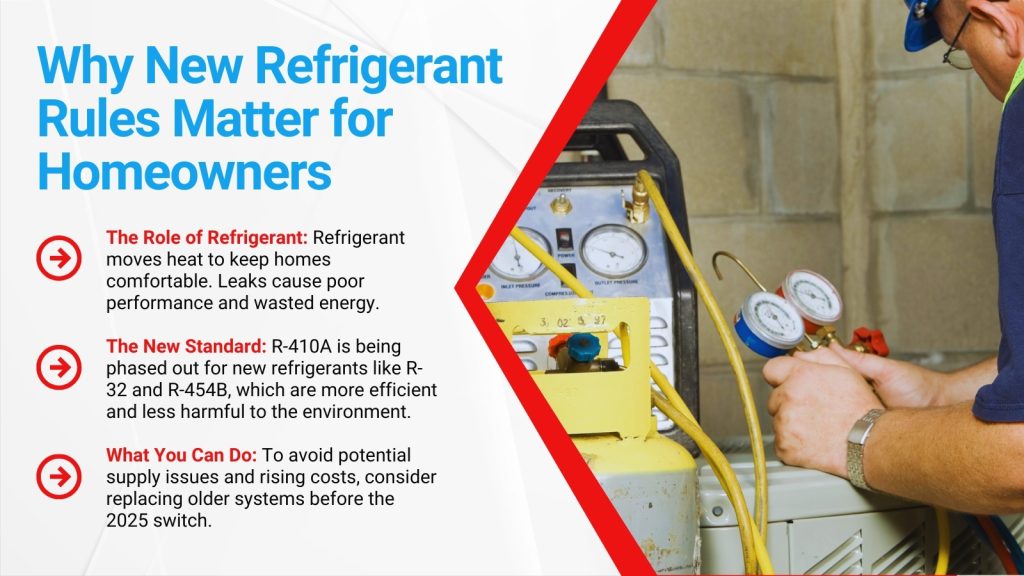
Like any industry, HVAC manufacturing changes over time. When new approaches are discovered, new materials become available, or old methods are less than ideal, people move forward. And in recent years, there have been some exciting changes in the world of air conditioners and heat pumps! If you’re considering switching to a modern ductless mini split, now is a great time to explore your options.
Multi-phase compressors, variable-speed fans, and new ways of constructing coils have all improved AC and heat pump efficiency and made it possible to save a lot of energy. And there’s a new change coming that you should know about. The type of refrigerant being used in AC and heat pump systems is changing. Why? How will it affect you? We’ll tell you all about it.

What Does Refrigerant Do in HVAC Systems?
The coils of heat pumps and air conditioners contain refrigerant, a chemical compound which is able to absorb and release heat by changing phases from a liquid to a gas and back again. As it flows through the system, it can move heat from place to place, carrying it outdoors during hot weather and, in the case of a heat pump, carrying it in when the weather is chilly. If you’re considering an upgrade, choosing a heat pump may offer both performance and energy advantages.
This substance is not like fuel or oil. It does not get used up during the process, it simply moves through a closed loop. However, if the coils are damaged, the refrigerant can leak out. This prevents the system from working properly, leading to wasted energy and poor performance, so leaks need to be patched promptly and the refrigerant refilled.
Upcoming Refrigerant Changes in 2025
Many years ago, the refrigerant chemicals used in air conditioners as well as refrigerators and freezers were chlorofluorocarbons or CFCs like Freon. CFCs caused a lot of environmental harm, in particular to the ozone layer. To reduce this harm, manufacturers started using hydrochlorofluorocarbons. The most common was R-22.
New options — hydrofluorocarbons or HFCs — became available, and in 2010, systems started to be made with R-410A instead. But new research continues to improve upon our old techniques, and today, the best options are R-32 and R-454B. That means R-410A is being phased out, and in 2025, new systems will no longer be made which use it.
Why the New Refrigerants Are Better for You and the Environment
Today, major legislation is in effect with the goal of reducing the amount that Americans spend on energy in our homes. And new refrigerants help accomplish that goal. By being much more efficient, as well as less environmentally-harmful, the new refrigerants will end up saving us all a lot of money.
What the 2025 Refrigerant Changes Mean for Homeowners Now
Unfortunately, some of the immediate impacts of the changes in manufacturing will not be quite as delightful. Changes like this can lead to increased manufacturing costs, which are passed on to consumers, as well as potential supply-chain delays. Your best option may be to replace your AC or heat pump system as soon as possible to avoid feeling these affects and to make sure you don’t end up with an old system leaking refrigerant that can no longer be refilled. For some homeowners, this could be the perfect opportunity to switch to an energy-efficient heat pump and take advantage of current technology upgrades.
Want to find out more? We’d love to have a conversation with you about AC or heat pump replacement in Blythewood, SC.
Frequently Asked Questions
Question: What refrigerants are being phased out in 2025?
Answer: R-410A, a common hydrofluorocarbon (HFC) refrigerant, is being phased out. Starting in 2025, new AC and heat pump systems will no longer be manufactured using R-410A.
Question: What refrigerants are replacing R-410A?
Answer: The leading replacements are R-32 and R-454B, both more efficient and environmentally friendly options.
Question: Why are these new refrigerants better?
Answer: They are more energy-efficient and less harmful to the environment, helping reduce energy use and long-term costs.
Question: What might homeowners experience in the short term due to these changes?
Answer: Higher manufacturing costs and potential supply delays may increase prices. Upgrading to a compliant system sooner could help avoid these impacts.
Question: Should homeowners replace their existing AC or heat pump systems now?
Answer: Yes. Replacing older systems before they require phased out refrigerant like R-410A can help avoid refill issues and future limitations on maintenance.
Contact Fulmer Heating & Cooling today for an HVAC expert in Columbia, SC!





